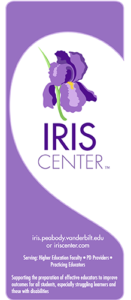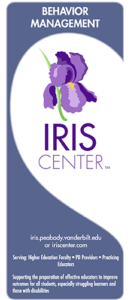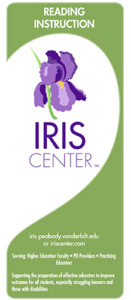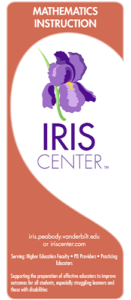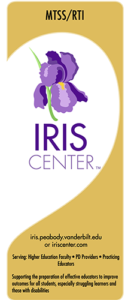Our Resources
For an overview of a few of our most popular resource topic areas, view and download these brochures:
Developed in collaboration with nationally recognized researchers and education experts, our center’s resources about evidence-based instructional and intervention practices—modules, case studies, activities, and others (including a number of Web-based tools)—are created for use in college instruction, professional development activities, and independent learning opportunities for practicing educators. Our center also offers resources to facilitate the use of IRIS materials by college faculty, professional development providers, and independent users.
IRIS Resources on the IRIS Resource Locator (IRL)
STAR Legacy Modules: The signature products of the IRIS Center, these resources offer in-depth looks at topics like response to intervention, classroom behavior management, secondary transition, student diversity, and many others of importance to educators in today’s classrooms. Our modules offer their content in a variety of formats: text, video demonstrations, audio interviews with experts and practicing educators, and interactive activities. Based on the adult learning theory developed by Dr. John Bransford and his colleagues, IRIS Modules make information on evidence-based practices more accessible and easier to learn than is otherwise possible for many busy educators. Click here to learn more about adult learning theory.
Case Studies: These multi-part resources ask users to analyze and respond to a number of problem-based classroom issues and challenges—for example classroom norms and expectations, algebra instruction, or classroom arrangement—through increasing levels of complexity and detail.
Course/PD Activities: Looking for handy, focused resources for use as independent assignments or to promote classroom discussion? IRIS Course/PD Activities cover a diverse range of topics, including behavior management, language disorders, disability related language in federal law, and many others.
Fundamental Skill Sheets: Practical and informative, Fundamental Skill Sheets offer educators quick primers (or reminders!) about discrete skills and practices indispensable to their role as effective classroom teachers. Fundamental Skill Sheets cover everything from specific praise to proximity control, telling teachers What It Is, What the Research & Resources Say, Steps for Implementation, Tips for Implementation, Implementation Examples (including demonstration videos of both correct and incorrect implementation), Things To Keep in Mind, and References & Resources for further study.
Information Briefs: These online resources developed by other programs and centers are collected and curated by IRIS as supplemental materials. Information briefs cover everything from accommodations for students with disabilities to Universal Design for Learning and peer-assisted interventions.
Interviews: These in-depth discussions with nationally recognized experts or instructors in the field cover a wide variety of topics, including student diversity, testing accommodations for students with disabilities, RTI implementation, and much more.
Video Vignettes: These annotations of and links to videos about individuals with disabilities, their families, advocates, teachers, and service providers includes videos about the history of disabilities, as well as depictions of the application of evidence-based practices in educational settings. (Note that some of the videos in this collection might make use of terminology that is no longer current. The inclusion of a video does not necessarily reflect endorsement by the IRIS Center.)
To begin searching for these resources, visit the IRIS Resource Locator.
Other IRIS Web-based Instructional Resources
The IRIS Center produces Web-based tools to support and be used in personnel preparation activities. These resources are available under the Resources menu of this website.
Evidence-Based Practice Summaries include annotations of research about the effectiveness of instructional strategies and interventions. This growing collection contains annotations and links to research reports and includes information about an intervention’s level of effectiveness and the age groups for which they are designed.
Our HLP High-Leverage Practices (HLP) Alignment Tool makes identifying which IRIS Modules and Case Studies align with which HLPs a snap. Developed by the Council for Exceptional Children and the CEEDAR Center, high-leverage practices are 22 essential special education techniques that all K-12 special education teachers should master for use across a variety of classroom dimensions and circumstances. The tool, which allows IRIS users to search or filter information via a user-friendly interface, also provides links to more detailed information for those who wish to learn more.
Curated in conjunction with Mary Anne Prater-Doty, a leading expert in the field today, Books: Portrayals of People with Disabilities contains information and synopses of children’s and young adult literature about or having to do with people with disabilities. This information includes the name of the author and illustrator, year of publication, publisher, appropriate grade level, and award status.
Our search tool Films: Portrayals of People with Disabilities represents an attempt to catalogue the representation of people with disabilities in motion pictures. Many of those representations are inaccurate, and some are offensive. Their inclusion in this tool is intended to stimulate discussion and should by no means be considered an endorsement of their accuracy or appropriateness.
The Web Resource Directory is a list of other federally sponsored projects and centers that provide resources and information useful for educational professionals.
Use our online Glossary to look up definitions for the disability related terms that are covered in many of our resources.
IRIS Resources To Support Coursework and Professional Development
The IRIS Center develops resources for college faculty and professional development providers. These resources, located in the Using IRIS section of our website, are designed to facilitate the incorporation of information about evidence-based practices into personnel preparation.
Coursework Planning Forms, also found under For Faculty, are designed to help faculty as they revise either their individual courses or overall curricula for the initial preparation of education professionals.
Our Learning Pathways Collection is designed to help states and districts develop a structured plan for ongoing professional development as well as professional development and personalized learning opportunities for early career professionals and paraeducators. These tools identify resources in high-need topic areas (e.g., behavior management, IEPs) and demonstrate how they can be sequenced and bundled to produce engaging activities to improve educators’ knowledge and skills.
Tips for Professional Development Providers, found in the For PD Providers section under Using IRIS, contains a wealth of suggestions about how IRIS Modules can be integrated into professional development activities.
Planning Forms, specifically created For PD Providers, are designed to help PD providers develop and revise activities used to upgrade the skills of practicing education professionals.
Finally, Standards show how specific IRIS resources cross-reference with specific standards and should be useful in designing curricula for credentials and licensure.
